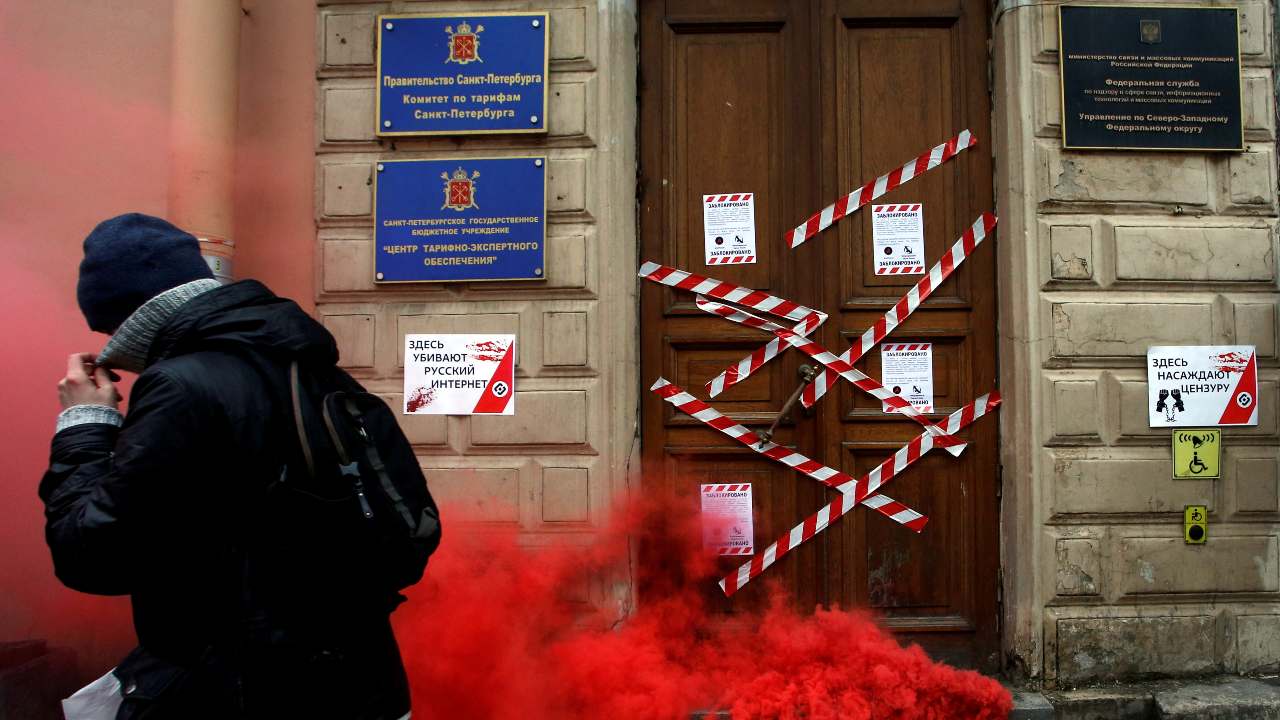Stas Kozlovskiy, a leader of the Wikipedia community in Russia, didn’t expect anything good when he walked into a large rectangular room in the State Duma, Russia’s lower house of parliament, last week to discuss new legislation on “landing” global tech platforms on Russian soil.
The meeting was chaired by Alexander Khinshtein, a stocky man in a blue suit, the head of the information policy and IT committee at the State Duma and former journalist, who gained popularity in the 1990s primarily as a voice of the FSB, Russia’s formidable security service. Recently, he has attracted national attention as a man who provided support and facilitation for the Kremlin’s latest initiatives in tightening control over the internet.
The legislation he proposed now would require tech platforms, including Facebook, Twitter and Google, to open offices in the country and register with the Internet censorship agency Roskomnadzor to help block information the Russian government doesn’t like. The objective is to put tech giants in a vulnerable position by forcing them to comply with the Kremlin’s requirements, or face the unpalatable alternatives of huge fines, a service shutdown, bans on advertising their services, or hosting ads on their platforms.
“Our draft law would oblige owners of large information resources with a daily audience in Russia of at least 500,000 people to open official offices, which would fully represent their interests and answer for their activities,” Khinshtein wrote on his Telegram channel. The bill is expected to be adopted by the end of June and to come into force next year.
A seasoned fighter against internet censorship, Kozlovsky opposes the bill. He argued that the opening of an office in Russia would immediately lead Wikipedia, a non-government organization, to be designated as a foreign agent. Predictably enough, most Western platforms mirrored his stance.
And yet, some of those present at the meeting supported the legislation. Among them were the representatives of two Chinese companies, Huawei and AliExpress. Huawei is not in fact subject to the proposed legislation — it could hardly be described as an information resource with a big daily audience. But the two Chinese companies “landed” on Russian soil years ago, and both have been cooperating closely with the Russian authorities. The involvement of big Chinese corporations was no accident — Russia is taking strides toward China’s approach to the internet. Russia’s censors have always kept the Chinese model in their minds.
The two countries’ top internet censors regularly exchange visits, including Fang Binxing, the architect of The Great Firewall; Russia and China signed several bilateral agreements on the internet, including one on cooperation in information security. That agreement underlined the importance of the sovereign internet – the idea that every nation has a right to control the internet in their country.
The sovereign internet was a response to the Kremlin’s recognition that local filtering efforts — by forcing internet service providers (ISPs) to block undesirable websites, internet protocol (IP) addresses, and pages — had proved clumsy and inefficient. The videos about Putin’s palaces and the investigations into the corruption of senior officials remain accessible. The technology failed the Kremlin.
Designed to solve this problem, the sovereign internet, relies on hardware called “Red Boxes,” installed at ISPs, internet exchange points, and operators throughout the country. The boxes connect to the Control Command Center in Moscow and it allows the censors to play with the traffic, by remotely blocking, slowing, or redirecting information flows, in any region.
The new system could block services like YouTube at will, but it also can slow global platforms to a crawl, as happened to Twitter this spring. The Kremlin was extremely pleased by the outcome: Andrei Lipov, the head of Roskomnadzor, proudly announced that Twitter had removed 91% of the “illegal content” and had sent a conciliatory letter to Russian censors asking them to stop. Russia is now eager to export the idea of sovereign internet across the world, and it has many supporters among developing nations. The primary tool is Russia’s activities in international organizations like the International Telecommunication Union (ITU), a UN agency.
Recently, Russia announced its candidate to head the ITU. Rashid Ismailov, is a former deputy chief of the Russian communications ministry and a former executive at Huawei. (The election will be held in 2022). A gray-haired and mild-mannered man in his mid-50s, Ismailov speaks fluent English. He graduated from university as a historian and spent most of his career in telecom business. But his manners cannot disguise a tough stand towards internet freedoms. Smart and technically savvy, he is very proud that he was CEO of the Russian company tasked by the government to install Red Boxes throughout the country. And indeed, his effort was productive —100 % of Russian mobile traffic is filtered through sovereign internet infrastructure.
Ismailov has been very honest and straight, talking at the Russian Internet Governance Forum in April. He said that the monopoly of global tech giants prevents the development of domestic companies and echoed the point of many Western countries that such firms to pay a fair share of taxes in the countries where they operate. But he used the point to reach a very different conclusion — arguing these facts made it necessary to establish new internet standards, with a goal to eliminate “digital inequality” in developing nations and adopt common standards for digital identification. That his argument has nothing to do with economics or fair competition but is purely political is clear from the first public application of the sovereign internet he had helped to build, its use forced Twitter to remove tweets and links about the recent protests in Russia.
Now the Kremlin is using the same system to harass Google and to force it to take down YouTube videos the Kremlin dislikes. This offensive won’t stop with Twitter and Google, neither will it be limited to Russia’s borders — Ismailov’s ITU candidacy being the proof.




